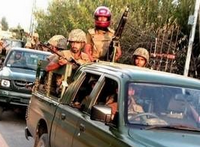Last Tuesday’s deadly attacks on Shiite processions in Kabul and Mazar-e Sharif in Afghanistan are further evidence of dangerous instability in neighboring Pakistan and of the Pakistani state’s failure to act coherently to counteract it. A clear understanding of the group responsible is important to understanding the crossborder ramifications of the attacks.
Contrary to reports in prominent news outlets, the Pakistani Sunni sectarian terrorist group Lashkar-e Jhangvi (LeJ) was not responsible for the attacks. Rather, an LeJ splinter group known as Lashkar-e Jhangvi al-Alami (LeJ-A) -- not the original LeJ organization -- has claimed responsibility for them. A person claiming to be an LeJ-A spokesman made the announcement in communication with a number of news outlets, including BBC Urdu and Deutsche Presse-Agentur.
LeJ-A has claimed responsibility for a small number of very deadly attacks in Pakistan since 2009. These include attacks on Shiite Muslims in Kohat in 2009 and 2010: a September 2009 attack on a market in a predominantly Shiite area that killed 33 people, and an April 2010 attack on internally displaced Shiites that killed 44 and injured 70. In addition, multiple attacks on a Shiite procession in Lahore in September 2010 killed 29 civilians and injured 243.

